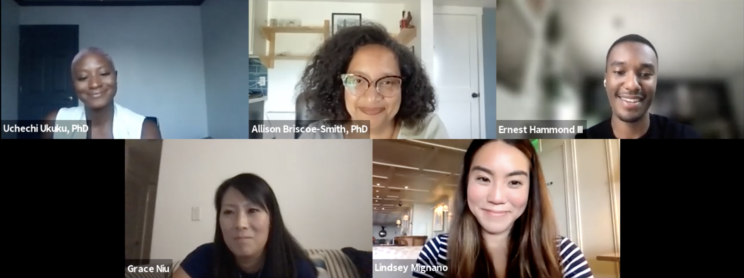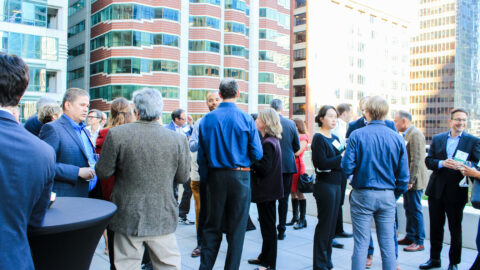As increases in police brutality and hate crimes are alarmingly prevalent even here in San Francisco, the Barristers Diversity and Inclusion Committee of the Bar Association of San Francisco (BASF) hosted a timely discussion about Mental Health and Well-Being for Black and Asian communities. The fireside chat featured Dr. Allison Briscoe-Smith, Director of Diversity, Equity and Inclusion, The Wright Institute Clinical Program; Grace C. Niu, PhD., Licensed Clinical Psychologist, VP of Clinical Strategy & Operations, Neurotrack Technologies; Dr. Uche Ukuku, Licensed Psychologist; and was moderated by Barristers Club Board Members, Ernest Hammond III, Twilio and Lindsey Mignano, Smith Shapourian Mignano.
The discussion opened with Ukuku explaining community trauma is chronic, ongoing, and has a compounding effect that society witnessed in the last year. The onset of protests and COVID-19 proved to be a breaking point for people, leading to an influx of new patients seeking therapy.
“We understand trauma as a continuation of stress, and trauma happens when the trauma is too big, or either too prolonged,” said Briscoe-Smith. “We have incidents of watching viral Black death and seeing our Asian community be targeted and harmed.”
Within the communities Briscoe-Smith serves, she claimed to have seen more childrens’ lives lost due to suicide rather than COVID, as a result of isolation and exposure to trauma. “We’re carrying this around in the palm of our hands, watching our society be harmed. This is happening within individuals as well as at the community level, and happening while oppressive, racist systems are trying to pit us as people of color against each other.” However, she explained, “from this arises an opportunity to think about the ways in which we can be a community for our survival and healing.”
The speakers shared a wealth of helpful tips for people who are struggling to process these incidents emotionally. Niu expressed that people repeatedly watch the same video out of disbelief that what they are seeing is real. However, engaging in this cycle leads to the re-experiencing of trauma. Niu strongly encouraged her patients to instead shift the focus to ask themselves, “What is the reaction and what are the feelings you have when seeing this?”
Processing these emotions and reactions through journaling can be helpful. Echoing Niu’s sentiment, Briscoe-Smith advised to ask yourself if you feel in control when watching these videos and to reflect on who this benefits, since repeatedly watching a video can reduce empathy. Lastly, Ukuku expressed that people should steer away from attempting to make sense of these incidents. “What would ever be an appropriate answer as to why that happened? Is there any reason that justifies the event happening? Try to back away from finding the meaning or purpose in it,” she explained.
In light of the recent attacks on the Asian American community, it’s crucial to destigmatize seeking out professional help for mental health, especially within the older generations. Niu suggested that we can approach this by bringing the professionals to the patients, rather than bringing patients to a foreign place: ensuring that the services are happening on their own familiar turf would destigmatize getting help.
Briscoe-Smith took a wider approach by emphasizing that destigmatization starts with rebuilding who works in these systems. She called for the strong need to cultivate a generation of Asian providers, as the majority of the field of therapy remains predominantly white. “We have to overcome barriers to accessibility which includes changing up services, doing outreach, normalizing asking for help,” said Briscoe-Smith. “We have to decolonize the way that we provide treatment in the first place.”
Many minorities often feel marginalized in the workplace and face a mirage of microinvalidations and microaggressions. In order to cope with these issues and thrive in spite of these adversities, Niu advised that people should always look into the leadership board and the people who work at the firm where you’re interviewing. Taking time off and setting boundaries in the workplace plays a significant role when dealing with these types of issues.
It can be difficult to pinpoint the right time to seek out professional help, but the speakers agreed that the time to ask for help is right now. Briscoe-Smith said to take this step “to destigmatize the notion that therapy only has to happen in the context of crisis. Therapy is a powerful means of self-care and investing in yourself.”
However, Ukuku highlighted signs when it may be time to seek help, including if you have noticed that your functioning is starting to decline, you’re having an increase of certain emotions, or experiencing isolating tendencies. Not all therapists are a good fit for everyone. “Therapy is like trying on shoes. You wouldn’t try on one pair of shoes and say it doesn’t fit, and then stop wearing shoes,” said Briscoe-Smith.
The speakers concluded by recommending resources to help find therapists of color, ranging from services like BetterHelp and Two Chairs, but also reaching out to your own community and network to learn about what has worked for others.
You can view the entire discussion here.
This program was put on by the Barristers Diversity and Inclusion Committee and sponsored by Ad Astra Law Group, Bracamontes & Vlasak, Burke Family Law, Clements Employment Law, Cohorn Law, Steven Adair MacDonald & Partners, Tong Law, and Zarate Dulany Law.




